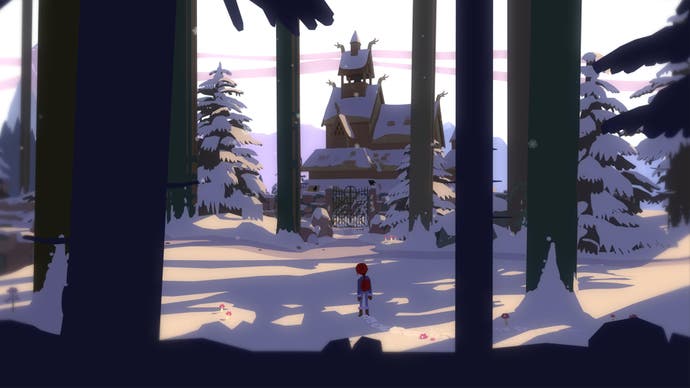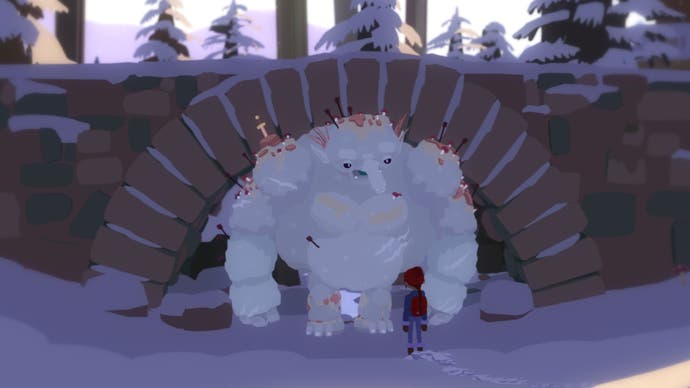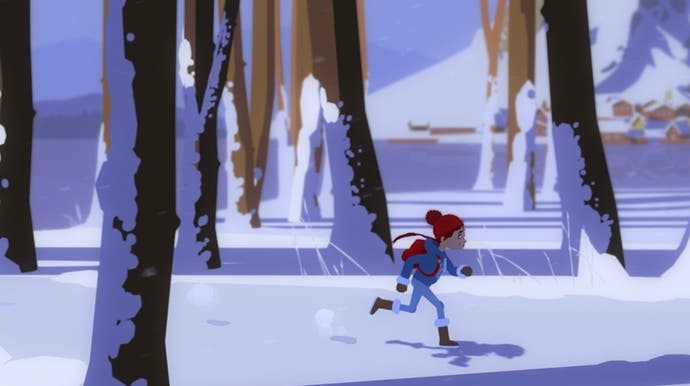Röki review - If you go down in the woods today...
Herring-do
Like a lot of things based on Scandinavian folklore, Röki looks cute but isn't really. This is entirely to its credit - and to the enduring credit of Scandinavian folklore, I imagine. Röki's about woodland ponds, but it's also about pond scum. It's about sweet little animals, but it's also about the skulls of sweet little animals. And it's about magic, but what it's really about is the stuff that magic can't undo. I was gently moved for a few hours and then I was clobbered, gorgeously, over the head. This game hurts. I love it.
Röki is a point-and-click adventure about Tove, a girl out looking for her little brother, who has been taken by mysterious forces. It's about her family, still woozy from a devastating loss that none of them can properly face, and it's about the surrounding landscape, which is sparkling with ice and frost and rich with strange beings and dark histories. Stone trolls litter the forest paths and real trolls may lurk in the deeper shadows. Wooden churches, fitted with carved gargoyles, poke from glittering drifts of snow. Stone and moss are in stalemate. Don't ask about the mushrooms.
Tove's objective - and this is as much as I'm going to spoil - involves tracking down a group of forgotten giants who once tended the land, so her mission is really about understanding the landscape that she is exploring. It's a fascinating place. Caves and temples and forests are hardly new to video games, but they seem freshly wrought here, glittering snow banked up against rocks, runes etched into ancient walls, wooden models of ravens dangling from trees. A path of gnawed rib bones might lead you deeper into a lair. A twilight grotto may have bookcases and chairs stacked by the oily shore. A cauldron might burble in the depths.

Secrets abound - floors with cracks that show hidden rooms, staircases that fold down into the soil. The pleasure of an adventure game comes from what you are working towards as much as what you are actually doing moment to moment, and there is always something to get open here, something to coax back to ancient life. In the game's long second act there is a fast travel system so beautifully conceived that I often used it just because it actually felt like magic - old, earthy magic of the kind that the game is so good at, magic with sharp edges and a kind of deep, frowning pragmatism at the core.
As an adventure game, Röki keeps things simple. Collected items go straight into your backpack where they can be dragged onto parts of the landscape to use them or onto other objects to combine them. Interactive hotspots can be revealed with a press of the thumbstick that also rings out a nice chime, like the wind through hanging bells. This means that unspoken reality of most adventure games - that you pick through their stagecraft worlds like a hungry crow searching for the only morsels that count - has a kind of thematic resonance to it. I would walk through the forests in Röki, very much alone, but banging the thumbstick and making the objects around me glow and the bells chime, as if I was singing to myself to keep my spirits up.

The puzzles are clear-eyed often multi-step affairs, but they bury themselves in the folds of the story so that they never feel like busywork. Not only are you always working multiple leads at any one moment so there's no real chance to get properly stuck in that hot headache adventure game way that makes you start considering whether the game is broken, there is always a context that means collecting three doodads feels important in a very human way. Tove's looking for her brother, but her wider actions often involve kindness and understanding - she is making sense of the world and trying to help the people in it as she works her way closer to her goal. This is that rare video game that hinges on empathy and mercy, and it's built into the puzzles as much as the narrative. And, yes, always that splinter of malice that Tove is working towards, that thing that transforms a cute winterland fantasy into something thrilling.
Towards the end of the journey, changes to the basic design lend events and puzzles a cumulative force that many adventure games lack in their climactic moments. Even better than tricks like this, though, is the notebook that Tove carries through the whole adventure, filled with notes of what she's seen as a memory aid for puzzles, but also maps of the territory that are slowly filled out, badges that stand in for achievements and "loot" - scraps of feather and egg shell and other wonders found along the way. It's a reminder that Röki's horrors and joys are all the richer because they are viewed from a child's perspective. To step into this game is to be small and lost in the woods, and to be determined in that bright and undiminished way that characters in the best children's books are. It's earthy magic. It's fantastic.




